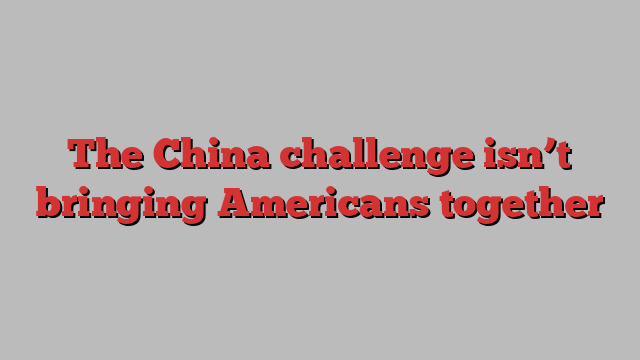
Unlock the US Election Countdown newsletter for free
The stories that matter on money and politics in the race for the White House
When the Berlin Wall came down, a wall went up in Washington. Democrats and Republicans, who had co-operated as a matter of routine during the cold war, grew distant from around 1989. Perhaps the disappearance of a common adversary called the USSR freed the two parties to turn on each other.
Is this too neat? Something a psychotherapist might say? Well, consider a few data points.
Before 1989, there had been one presidential impeachment in US history, or two if we count the one Richard Nixon pre-empted by quitting. There have been three in the short time since. Before 1989, the Senate would often approve a judge for the Supreme Court without a single dissenting vote. This hasn’t happened once since. Before 1989, landslide presidential victories were frequent. No one has commanded broad enough support to reach even 400 electoral college votes since George HW Bush, the last cold war president. I suppose it could all be a coincidence. But other partisan forces that emerged after the wall fell include Fox News (1996), its liberal antagonist MSNBC (1996) and Newt Gingrich’s “revolution” in Congress (1994).
The evidence is circumstantial, but hard to dismiss, that something broke in US politics once the nation no longer faced a serious external challenger. Now that one exists again in China, or the China-Russia axis, it follows that some of that old bipartisan ethos should return. The answer to domestic strife — I used to be sure of this — lies abroad.
So far, it has to be said, this theory of mine is ageing like milk. The US finds itself externally challenged and internally split at the same time. The bonding effect of having a shared national rival is nowhere to be seen. “Give it time”, is the obvious response, but China has been eating into America’s share of global output for decades. We might expect by now at least the first signs of that togetherness in adversity that footballers call siege mentality. Instead, we have the 2024 US election: another super-tight and acrimonious race whose result is liable to be contested.
What makes this all the stranger is that there is no disagreement about China. Both political parties regard it as a singular problem for American power and values. Both are willing to break from pro-trade orthodoxy to keep the US ahead. There is some divergence on the subject of the wider autocratic bloc, with Republicans on average more exercised about Iran and Democrats about Russia. (Donald Trump’s running mate, JD Vance, has talked of the latter as almost a distraction.) But the consensus on China itself is striking. It just doesn’t translate into a broader domestic solidarity, as fear of the Soviets seemed to for around half a century.
Why not? No doubt, the countries are too enmeshed for the one to define itself against the other. The US can’t have a “cold war” with the main supplier of its imported goods and second-largest foreign holder of its public debt. China is, or has been, accessible in a way the Soviet world wasn’t. Nor is there an exact equivalent of occupied Berlin or the 38th parallel in Korea, where the two camps are at daggers drawn. (America has no formal defence commitment to Taiwan.)
On the other hand, modern China is a much more daunting proposition than the USSR, which had become the butt of Lada jokes long before its formal dissolution. No one laughs at China’s cars; they put tariffs on them. Its population dwarfs America’s to an extent Soviet Russia didn’t. The Beijing-Moscow bond is tighter now than it was for much of the cold war, to say nothing of the linkages with Iran and North Korea. If an external challenge on this scale can’t induce Americans to rally around the flag, whatever would?
In retrospect, for all that other countries chafed against it, the “unipolar moment” after 1989 had perverse consequences for the US itself. It is when the 50-50 nation emerged. (If the presidential candidates were Jesus Christ and Dick Dastardly, the election would still come down to tens of thousands of voters in a half a dozen states.) The odd thing is that this bi- or multipolar era isn’t having the reverse effect, at least yet. Having been in Democratic hands from 1955 to 1995, the House of Representatives has flipped from party to party several times since. The competitiveness is healthy. The absence of consensus isn’t.
A nation is to some extent a trick of the mind: a pretence that a group of people within arbitrary and often recent borders add up to a timeless unit. That sense of fellow feeling relies at least in part on opposition to something else. (Which isn’t to say nations seek out conflict for that purpose.) The UK was edging towards violent civil strife before the first world war made the Kaiser the shared enemy. The following world war helped to glue the ethnically fractious America of the 1920s into a civic whole. National identities in central Europe have strengthened under duress from larger states to their east and west. There might seem to be something ignoble about this negative belonging: this finding of national unity in contradistinction to some Other. But the greater nightmare is when it doesn’t happen.